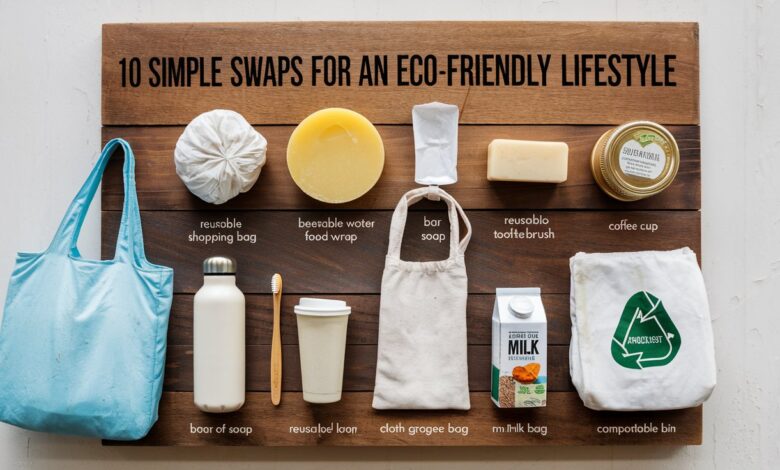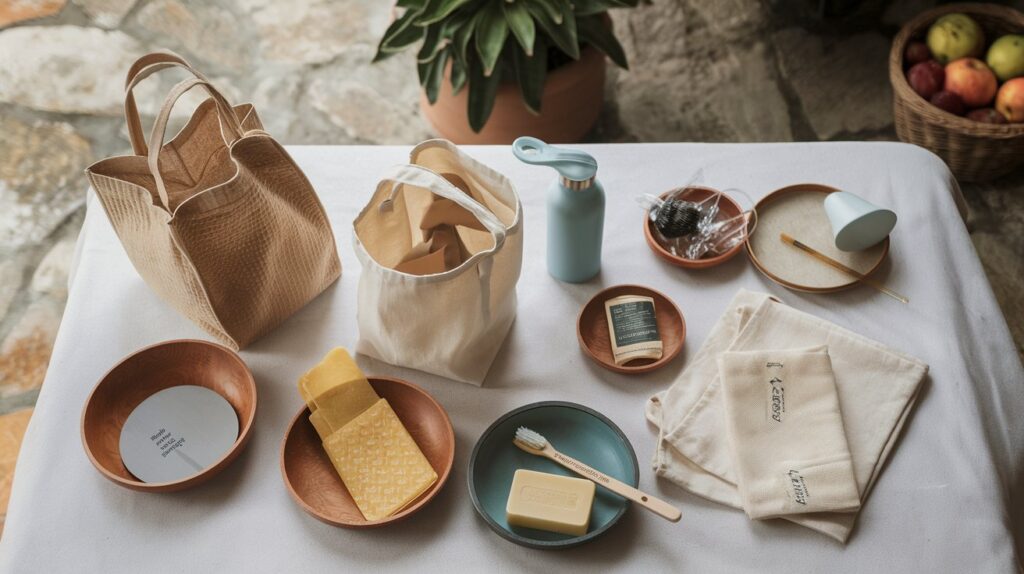10 Simple Swaps for an Eco-Friendly Lifestyle

Imagine waking up each day knowing that your choices are making a positive impact on the planet. An eco-friendly lifestyle isn’t just a trend; it’s a commitment to living in harmony with nature. With small changes, you can reduce your carbon footprint and contribute to a healthier environment for generations to come.
Switching to an eco-friendly lifestyle may seem daunting at first, but it doesn’t have to be overwhelming. In fact, some of the simplest swaps can lead to significant improvements not only for the earth but also for your well-being. Are you ready to discover how easy it is? Let’s dive into ten simple swaps that will help you embrace sustainability while enjoying everyday life!
What is an Eco-Friendly Lifestyle?
An eco-friendly lifestyle is all about making choices that benefit the environment. It involves being mindful of how our actions impact nature and striving to reduce harm whenever possible.

This way of living prioritizes sustainability, which means using resources wisely and minimizing waste. It’s about finding balance with what we consume and how it affects our planet.
People who embrace an eco-friendly lifestyle often seek out renewable energy sources, like solar or wind power. They also opt for products made from sustainable materials or those that are recyclable.
Beyond just personal habits, this lifestyle encourages community engagement. Supporting local businesses and participating in environmental initiatives can amplify positive change.
An eco-friendly lifestyle promotes a deep connection with nature while fostering a sense of responsibility towards future generations.
Why Should We Make the Switch?
Transitioning to an eco-friendly lifestyle isn’t just a trend; it’s a necessity. The planet is facing unprecedented challenges, from climate change to pollution. Our individual choices can significantly influence these issues.
Making the switch helps reduce your carbon footprint. Small actions accumulate over time, leading to substantial environmental benefits. Choosing sustainable products means supporting companies that prioritize our planet’s health.
Additionally, adopting eco-friendly habits often enhances personal well-being. Many green products are free from harmful chemicals and toxins, resulting in better air quality and overall health.
Culturally, embracing sustainability fosters community engagement and awareness. When you make conscious choices, you inspire others around you to rethink their consumption patterns too.
Each step towards an eco-friendly lifestyle contributes to a healthier Earth for future generations. It’s about creating lasting change that reflects responsibility and care for our shared home.
Simple Swaps for Your Daily Routine
Making small changes in your daily routine can lead to a more eco-friendly lifestyle. Start with your morning coffee. Swap disposable cups for a reusable travel mug. It’s an easy way to cut down on single-use waste.
When it comes to personal care, choose bar soap instead of liquid body wash that comes in plastic bottles. This simple switch not only reduces packaging but also often contains fewer harmful chemicals.
Think about your commute as well. If possible, walk or bike instead of driving short distances. Not only does this lower carbon emissions, but it also promotes a healthier lifestyle.
In the kitchen, replace plastic wrap with beeswax wraps or silicone lids for food storage. These alternatives are durable and help minimize waste while keeping your food fresh.
Every little change matters when striving for an eco-friendly lifestyle; even small swaps add up over time and create lasting impact.
Eco-Friendly Products and Brands to Try
Exploring eco-friendly products opens up a world of sustainable options. Many brands are leading the charge toward greener living.
Consider trying out bamboo toothbrushes. They offer a fantastic alternative to plastic, and they decompose naturally after use.
For skincare, look into brands utilizing natural ingredients in recyclable packaging. Companies like Ethique focus on solid beauty bars that cut down on plastic waste.
Household cleaners can also be green! Brands such as Seventh Generation provide plant-based cleaning solutions that are effective yet gentle on the environment.
When shopping for clothing, check out companies like Patagonia or Everlane, which prioritize sustainability and ethical manufacturing processes.
Don’t overlook reusable items—like silicone bags or beeswax wraps—instead of single-use plastics. These small changes add up over time and contribute to an eco-conscious lifestyle.
Sustainable Fashion Choices
Sustainable fashion is about more than just trends; it’s a commitment to mindful choices. Opt for brands that prioritize eco-friendly materials, such as organic cotton or recycled fibers. This shift reduces the environmental footprint of clothing production.
Thrift shopping is another great way to embrace sustainability. Vintage pieces not only add character to your wardrobe but also keep textiles out of landfills.
Consider capsule wardrobes too—curate versatile outfits you love and wear them often. Less can truly be more when it comes to style.
Support local artisans who create handmade garments from sustainable sources, promoting fair trade practices while reducing carbon emissions associated with shipping.
Don’t forget about upcycling! Transform old clothes into something fresh and exciting instead of discarding them. This creative approach brings new life to forgotten fabrics, making fashion both personal and planet-friendly.
Going Green in the Kitchen
Creating an eco-friendly kitchen is easier than you might think. Start by swapping out plastic wrap for beeswax wraps. They’re reusable and come in fun designs.
Consider your appliances too. Energy-efficient models save both energy and money over time. Look for the ENERGY STAR label when making a purchase.
Next, focus on ingredients. Buy local produce whenever possible to reduce carbon footprints associated with transportation. Farmers’ markets are great places to find fresh options while supporting your community.
Don’t forget about composting! It’s a fantastic way to recycle food scraps and enrich your garden soil simultaneously.
Use glass or stainless steel containers instead of single-use plastics for storage. They last longer, are healthier, and help cut down on waste significantly. Making these small changes can transform how you cook and eat sustainably every day.
Tips for Reducing Waste
Reducing waste starts with awareness. Take a moment to evaluate your daily habits. Are there items you routinely throw away that could be reused or repurposed?
Opt for products with minimal packaging, especially in groceries. Bring your own bags and containers when shopping. This small change can lead to significant reductions in plastic waste.
Consider composting organic materials like fruit scraps and coffee grounds. Not only does this cut down on landfill contributions, but it also enriches your garden soil.
Choose quality over quantity when purchasing items. Durable goods last longer and reduce the need for frequent replacements.
Get creative! Transform old clothes into cleaning rags or use glass jars for storage instead of buying new containers. Each thoughtful choice contributes to an eco-friendly lifestyle while minimizing waste effectively.
The Impact of Our Choices on the Environment
Every choice we make ripples through the environment. From the food we consume to the products we buy, our decisions shape the planet’s health.
Opting for single-use plastics contributes to pollution and waste. Conversely, selecting reusable items can significantly reduce landfill contributions.
The energy sources we support also matter. Choosing renewable energy helps decrease carbon footprints and fosters sustainability.
Transportation choices play a role too. Walking or biking instead of driving reduces greenhouse gas emissions.
What about our diets? Plant-based meals often have a lower environmental impact than meat-heavy dishes due to reduced resource consumption.
Even small actions accumulate over time, creating significant change in ecosystems and communities alike. By being mindful of what we choose daily, each individual can nurture a more sustainable future for generations to come.
Overcoming Challenges and Staying Motivated
Transitioning to an eco-friendly lifestyle can feel daunting. Challenges will arise, from finding the right products to breaking old habits. Recognizing these hurdles is the first step toward overcoming them.
Stay motivated by connecting with like-minded individuals. Join local groups or online communities focused on sustainability. Sharing experiences and tips can ignite your passion for change.
Set achievable goals rather than overwhelming yourself with a complete overhaul of your life overnight. Celebrate small victories, whether it’s using reusable bags or choosing a plant-based meal once a week.
Remember that it’s okay to slip up sometimes. What matters is getting back on track and learning from those moments. Keep reminding yourself why you started this journey in the first place—your choices matter.
Engage with inspiring content such as documentaries, blogs, or books about environmental issues. These resources can reignite your enthusiasm and provide fresh ideas for living sustainably each day.
Conclusion: Small Changes, Big Impact
Embracing an eco-friendly lifestyle doesn’t require a complete overhaul of your life. Small, manageable changes can lead to significant impacts on our planet. Each item we choose, each product we use, and each habit we form contributes to the larger picture of sustainability.
By making simple swaps in our daily routines—from reusable bags to natural cleaning products—we not only reduce waste but also inspire others to consider their choices. As awareness grows about the benefits of sustainable living, more individuals will recognize that every small action counts.
The journey toward an eco-friendly lifestyle is personal and unique for everyone. It may come with challenges or setbacks along the way, but staying motivated by focusing on progress rather than perfection can make all the difference. With countless resources available today—brands dedicated to eco-friendliness and communities supporting sustainable practices—it’s easier than ever to find ways that resonate with you.
Remember, creating a healthier planet starts with us as individuals. By adopting these simple yet effective strategies in our everyday lives, we contribute positively to environmental health while enjoying a fulfilling lifestyle filled with purpose and intention. Embrace those changes; they just might spark inspiration for someone else too!



